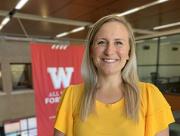You are on CGS' Legacy Site.
Thank you for visiting CGS! You are currently using CGS' legacy site, which is no longer supported. For up-to-date information, including publications purchasing and meeting information, please visit cgsnet.org.

As CGS summer intern Lydia Gandy-Fastovich was finishing her bachelor’s degree in human development at the University of California, Davis, she knew she wanted to do something in education. “I was really interested in education and how it’s a springboard for people to expand opportunities. In the K-12 setting, it’s also something that everyone in the U.S. experiences and it’s a very impactful time. But, teaching didn’t feel like a future career for me,” said Gandy-Fastovich. So, she worked in the human resources office at a school district and learned the business side of education and how the administration functions, but she didn’t feel like she was making an impact.
After applying to a few different graduate programs at the University of Wisconsin-Madison, Gandy-Fastovich settled on the educational leadership and policy analysis doctoral program. She had been drawn to education policy but had no experience in it. She says, “The ELPA program was one I felt very connected to, and it had a social justice oriented focus that I thought would be important for my training.”
In the early stages of her dissertation research, Gandy-Fastovich will focus on K-12 education, specifically working with parents who have children receiving special education in public K-12 schools. Of particular interest to her is working with parents of color and parents who aren’t native English speakers to learn more about their experiences navigating the system. According to Gandy-Fastovich, those communities are often left out, and data show there’s a disproportionate number of students of color in special education classes, especially Black boys. “I’m trying to unpack that a little bit. There’s federal law about special education that requires a parent be involved and provide a more holistic view of the child. I wonder if there are inconsistencies or gaps in how some parents are included that hinders that holistic view. A child not doing well in school doesn’t necessarily mean they need special education.”
While unclear as to what comes after her doctorate, Gandy-Fastovich has enjoyed working in higher education and could see herself following the higher education administration path, but she’s also enjoyed learning about the public policy and government affairs side of higher education during her time at CGS. “Understanding how advocacy happens, and all the ways you have to be plugged into what’s happening in the public policy arena has been eye opening. I’m learning how to translate complex policy so that it’s more accessible to a broad audience, and I’ve found that to be very exciting and really important work.”
Along the way, Gandy-Fastovich’s been fortunate to have good mentors. As an undergraduate, she had a graduate student mentor who was instrumental in helping her feel confident that graduate school was an option. For the last three years, she’s worked in the UW-Madison Graduate School’s Office of Professional Development. “I don’t know where I’d be if I hadn’t had that job opportunity and met my two supervisors, Eileen Callahan and Amy Fruchtman,” said Gandy-Fastovich. “The focus was always on us as students first, and then leveraging what we learned to build stronger professional development opportunities for graduate students. I actually knew a bit about CGS before my internship, because we used the CGS PhD Career Pathways data to determine programming and develop resources.”
Gandy-Fastovich’s advice to prospective graduate students is simple: connect with graduate students and mentors and learn as much as you can from them. “I’ve found that graduate students really appreciate the opportunity to talk about their work, so if you reach out to someone, they’ll generally be excited to talk to you.” Gandy-Fastovich also recognizes that people’s experiences and levels of comfort vary and believes the hidden curriculum is a challenge for many. “My family always assumed I would go to college; that was never a question. But, that’s not everyone’s experience and keeping perspective is so important.”
The CGS GRADIMPACT project draws from member examples to tell the larger story of graduate education. Our goal is to demonstrate the importance of graduate education not only to degree holders, but also to the communities where we live and work. Do you have a great story to share about the impact of master’s or doctoral education? Visit our WEBSITE for more information.




